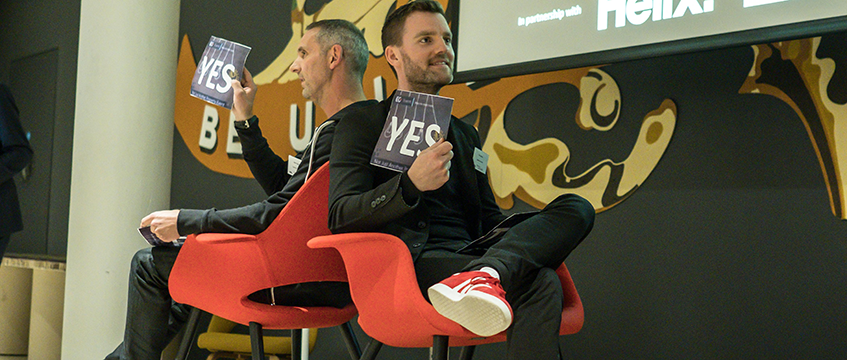Manchester-based developer Capital & Centric is tackling the problem of a lack of diversity in the industry with its own mentoring programme to inspire young people from varied backgrounds to start a career in regeneration. Now, co-founder Tim Heatley wants to work with other property companies to roll out the Regeneration Brainery concept around the country.
How did the idea for Regeneration Brainery come about?
Capital & Centric is a small company, so we’ve got limited ability to influence the make-up and demographic of the people that are employed in the regeneration and property sector. Therefore, we wanted to look at some kind of way of redressing the fact that when you’re at any property event and you look around, the people who are in that room are generally of a certain demographic. So there’s an opportunity to get a much broader demographic into our industry and to learn from them.
Who is it for?
We wanted to target young adults at a point in their lives when they are looking to choose a career, and to see if we could attract people from a broader range of social and economic backgrounds into the industry. The education sector doesn’t provide any signposting to property and regeneration, so that means that we miss out on a huge amount on talent, and means that other industries get the best of that talent – because there are already pre-existing signposts for them in the industry.
How does Regeneration Brainery work?
Brainery is an Americanism, it’s an American concept, which is knowledge transfer from people who have a knowledge in any particular area to a different group of people. The reason we didn’t want it to be called a course, or an academy, or any overly-educational name is because it’s not educational really, it’s meant to be inspirational. So, we didn’t want to teach people how to be an architect or a quantity surveyor, a project manager, or an agent, we just wanted to inspire them and show them what a vast and broad variety of careers there are in the sector.
These young people are prepared to give up their holidays, or they are prepared to give up earning money elsewhere to come and spend a week with us. And then we crowd-source mentors from across the industry to come and talk about a broad spectrum of the different jobs and careers and the different personalities that are involved in property development.
Tell us about the project the brainees had to do.
It’s hands on, so rather than just sit and listen to mentors all day, we wanted to take them out on to site, take them around projects, completed, under construction and about to start, to give them that broad spectrum, so they can see a bit of process and the progress that gets made through property development. In addition, we also wanted to let people have a bit of a go at it themselves. We gave them a project, a particular site, and we used it as a basis of practice, a place for them to see how they could develop that site in different ways.
So we selected a site in Manchester city centre, and let them use what they’d learned during the course of the week to come up with ideas about how to adapt and develop the site. It was interesting to see what they’d picked up on, what they’d learned, what influenced their final proposals, and remarkable to see how much progress these young people made in just a week. They came up with some fantastic ideas.
Why does it matter?
Getting young people into the property regeneration sector brings in new ideas, concepts and approaches to how we can do things. It helps the whole industry, I think, to be able to learn, adapt and survive, especially at this juncture, when things are changing rapidly through technology, and digital technology especially. And, of course, the younger demographic is massively more tuned in to what’s going on and what’s relevant, so it helps us to continue to improve and change.
How much impact does it have?
We’re all asked to contribute to charitable things, and it’s very easy to write a cheque and send some money and tick that box and move on, but here we wanted to go beyond that and give our time and our effort. The most valuable thing that we’ve all got, actually, is our connections, and one thing that these people don’t have is connections into industry. Sharing our connections with them is much more valuable than anything else we could do.
How can other property companies get involved?
We hope this model of creating connections for people, creating new networks for them, giving them new routes into the industry, can be emulated. We can provide a platform for property companies to adopt a similar approach and take it forward. I think a lot of the hard work has been done. It then just becomes a case of lining up mentors, and allowing property-related businesses to demonstrate what it is they do, how they do it and where they do it. And as long as you’ve got a willing set of property professionals, then you’ve pretty much got it made.
What next?
We hope that, over the next year or two, we can continue to run additional Regeneration Brainery events, not just in Manchester, but also in the other major cities around the UK. We would like to hear from other organisations that are interested in taking part or even running their own Regeneration Brainery. We’d happily provide them with the platform, the information and everything that they’d need to do that. We’d like to think that there could be a series of these courses and classes happening across the UK that could eventually result in a more varied, eclectic professional line-up in the regeneration sector.
To send feedback, e-mail Louisa.Clarence-Smith@egi.co.uk or tweet @LouisaClarence or @estatesgazette











